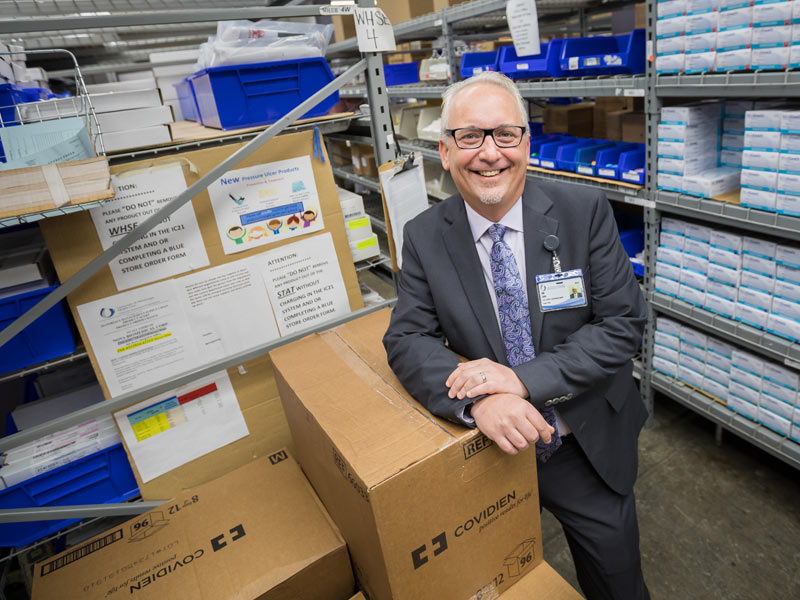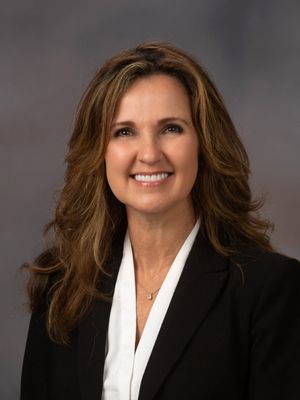Supply chain flexibility reaps financial benefits

Supply Chain employees at the University of Mississippi Medical Center have parlayed recent changes to the institution’s procurement process into more than $350,000 in value for the institution during the first 10 weeks of Fiscal Year 2018.
According to a report presented to UMMC’s executive leaders by William P. Stitt, chief, supply chain, the passage of House Bill 926, known as the Health Care Collaboration Act of 2017, which granted a clinical commodities exemption to the Medical Center to streamline its procurement processes, has allowed the Medical Center to realize the equivalent of $373,670 in savings from 22 items from July 1-Sept. 15.
The report projects UMMC could surpass $2,600,000 in savings value throughout the coming year.
The figures in the report represent a combination of tangible and indirect benefits. They are based on a ratio of salary savings for all employees involved in the procurement process of clinical items impacted directly by the legislation.
For example, an item that might have taken three months to obtain prior to the passage of H.B. 926 that now may take only three weeks to procure reduces the workload for each employee involved in the transaction, from those who make the initial order and oversee the supply inventory to those who directly acquire the item. The report reflects the savings in aggregate salary for all of these employees.
The bill was passed in the 2017 Regular Session of the Mississippi Legislature and was approved by Gov. Phil Bryant on March 28. It includes the provision that an academic medical center like UMMC or health sciences school “is not an ‘agency’ for those purchases of commodities . . . that are used for clinical purposes,” such as the diagnosis, cure, treatment or prevention of a disease or other conditions. The bill covers medical devices, biological drugs and radiation-emitting devices as defined by the U.S. Food and Drug Administration.
“We still have internal regulations in place to make sure we are being good stewards of our resources for UMMC,” Stitt said. “As a health care institution, the dynamics of the way we do business are different than any other state agency. This clinical exemption gives us a little flexibility in the way we procure clinical supplies and therefore ensures we provide care for our patients.”
Dr. LouAnn Woodward, vice chancellor for health affairs, said the savings come at a critical time for the institution.
“With reductions in reimbursement and other cuts to our revenue, supply chain remains a strong opportunity to realize savings, especially clinical procurement,” she said. “We’re grateful the Legislature gave us this additional flexibility, and we’re making the most of it.”

Stacy Baldwin, executive director of UMMC’s Office of Integrity and Compliance, said the legislation was needed to ensure the Medical Center could provide the best health care possible to all Mississippians.
“As an academic medical center that trains future providers and serves some of the sickest patients in our state, it is vitally important that UMMC have the ability to procure what is needed for patient care in a timely manner while utilizing methods that will ensure we get the best price we can achieve,” Baldwin said. “State regulations on commodity procurement had increased our procurement time and did not allow us to explore certain methods of procurement.
“Our governmental affairs team and others were instrumental in seeing this legislative request through.”
Baldwin, who created the Medical Center’s Clinical Procurement Task Force that determines UMMC’s internal processes for procuring clinical commodities and serves as its leader, said the exemption is beneficial to the institution in a number of ways:
- It allows the institution to decrease procurement time by eliminating the requirement that UMMC advertise bids for a two-week time frame;
- It eliminates the requirement that the Medical Center submit its bids to the state Department of Finance and Administration for approval before completing the procurement process; and
- It eliminates the requirement that institutions obtain DFA approval before performing requests for proposals for commodity procurement.
“In addition, the exemption will allow us to explore other methods of procurement, such as reverse auctions and electronic bidding, among others, which can have the potential to decrease our procurement timeframe while ensuring we are competitive,” Baldwin said. “Of course, all of these changes will lead to indirect cost savings – reduced manpower and the ability to provide more timely patient services in some cases, which can lead to increased patient satisfaction.”
Stitt said the legislative change has directly improved physician satisfaction as well.
“Physicians have commented on how less cumbersome the procurement system is,” he said. “The exemption has just made it easier to do business. We can get an item quicker, or if the commodity itself saves money, we can realize the cost savings quicker.
“This also gives us an opportunity to look at how we might leverage Supply Chain in other ways. We’re looking at partnering with other hospitals to enhance the value of our group purchasing opportunities. (The legislation) will allow us to partner with other physicians and health care organizations to show how we can save in other ways down the road.”
Stitt said he has learned a couple of valuable lessons from the report.
“No two procurement events are exactly the same,” he said. “Each contains a little variation, a little nuance – vendor dynamics, acquisition time, something. The reasons may be different, but none of them were the same.
“We were also constantly finding opportunities where we can improve the procurement process. We’re still working on the procedure we have in place that will, over time, help us find savings. That’s something we talk about and work on continuously.
“There’s lots of work to do in Supply Chain. How do we collaborate better? How do we make distribution better? This wouldn’t have even been possible to think about without the (legislative) exemption.”
To view UMMC’s Agency Procurement Update, click here.


